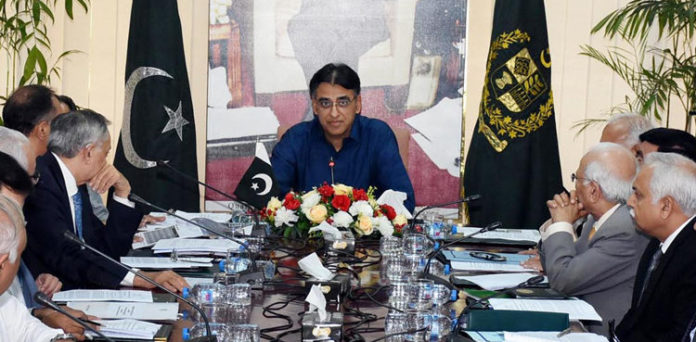- Commerce ministry asked to establish a permanent quarantine facility for cotton that is imported through land route
- Committee approves Rs1bn for payment of outstanding dues to families of deceased employees of Pakistan Steel Mills
ISLAMABAD: Considering the request of All Pakistan Textile Mills Association (APTMA), the Economic Coordination Committee (ECC) of the Cabinet on Thursday approved the import of cotton from Afghanistan/Central Asian Republics via the land route through the Torkham border.
The ECC meeting, which was chaired by Finance Minister Asad Umar, accorded the cotton import approval with a condition that all sanitary and phytosanitary regulations shall be abided. ECC also directed the relevant ministries to engage with the industry for the establishment of a permanent quarantine facility for cotton that is imported through land route.
As per the summary forwarded by the Commerce Ministry, the textile industry of Pakistan consumes around 12 to 15 million bales per annum. However, Pakistan is a net cotton importer and textile industry has to meet the shortage by importing cotton from other countries. Further, the summary stated that the domestic cotton is of short-to-medium staple length, therefore, long and extra long staple cotton has to be imported for production of finer yarn counts for subsequent transformation into high value-added finished products.
The meeting was informed that in order to bridge the gap in supply and demand of cotton, and availability of raw material for exports, Afghanistan and the Central Asian States should be considered as economical and alternate choices.
“Similar to last year, fumigation arrangements may be made either in textile units of importers or any designated area and cotton already arrived may be cleared. Afghanistan and Central Asian Republics may be asked to arrange pest scouting visit of Plant Protection Department of Pakistan during their cotton season. Permanent fumigation and quarantine facility may be developed in an area proposed by the Customs Department of Federal Board of Revenue at Torkham border as an alternate dry port,” the commerce ministry had proposed in its summary.
During the meeting, the committee also deliberated on the proposed plan of the Ministry of Energy with regard to gas load management during winters and decided to hold further discussions on the matter in the next meeting.
As per the summary forwarded by the ministry, the supply of natural gas peaked at 2.8MMCFD in 2010 and has since decreased to the present level of 2.2MMCFD.
“The shortage in supply of gas has necessitated gas load management across the country from time to time. Punjab suffered the most where Sui Northern Gas Pipeline Limited (SNGPL) could not supply gas to industry, fertiliser plants, power plants and CNG stations for seven months of the year and now 50 per cent of domestic consumers would not be provided with natural gas for cooking and heating purposes, from November to February,” it stated.
Given the wider difference in the natural gas sale price for domestic use and the RLNG price, the SNGPL may be provided direct subsidy against injection of RLNG volumes for use by domestic and commercial consumers based on actual RLNG consumption from Dec-18 to Feb-19, the Ministry of Energy proposed, adding that the mechanism of subsidy disbursement may be devised by SNGPL in consultation with Finance Division, or in the absence of injection of RLNG or subsidy, SNGPL will manage the load of domestic and commercial consumers through varied level of pressure management during off-peak hours.
The ECC meeting on the occasion considered the proposal from Ministry of Industries and Production and approved a grant of Rs1,066.078 million for payment of outstanding dues (provident fund, gratuity and payroll dues) to families of deceased employees of Pakistan Steel Mills.
The committee also accorded an approval for the sale of 200,000 tonnes of wheat from the surplus stocks available with Pakistan Agricultural Storage and Services Corporation (PASSCO) to the Poultry Association of Pakistan (PPA).
























